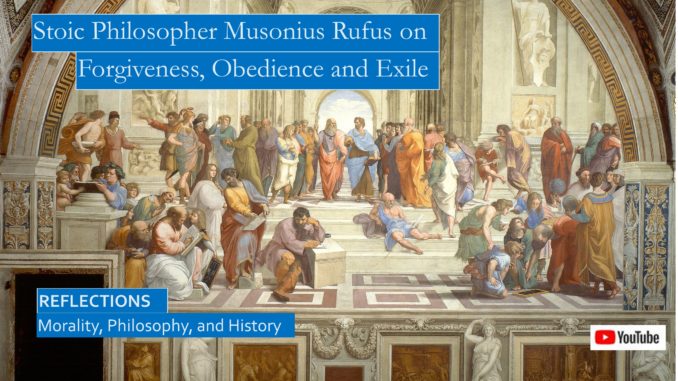
Musonius Rufus is best known through the lectures of his marvelous student, Epictetus. Like Plato and Socrates, Epictetus tells us so many delightful vignettes and teachings of his beloved Rufus that we really cannot distinguish between the thoughts of Epictetus and Musonius Rufus.
In addition to the writings of Epictetus, a small collection of Musonius Rufus’ writings come down to us from antiquity in an anthology by the Greek Stobaeus, and a few fragments quoted in other ancient works. We know he was exiled by Nero, and came in and out of exile under the succeeding emperors, Tacitus mentions he helped negotiate several treaties, and we know he taught in Greek and that he taught Epictetus, but we know little else about the life of Rufus.
Rufus and Epictetus sound more like father and son than master and student, so close is their stoicism. The similarities between Rufus and Epictetus and the Epistles of St Paul and the writings of the early Church Fathers are amazing.
YouTube video for this blog: https://youtu.be/2Ft0YOjfbP8
YouTube script for more book links: https://www.slideshare.net/BruceStrom1/stoic-musonius-rufus-on-forgiveness-obedience-exile-and-living-a-philosophical-life
BE QUICK TO FORGIVE
When someone wrongs us, should we file suit, or should we forgive and forbear? Rufus explores this topic in his lecture on whether a philosopher should file a suit when assaulted. He tells us that “those who do not know what is really good and what is really shameful, and who are overly concerned with their own fame, these people think that they are being injured if someone glares at them, laughs at them, hits them, or mocks them. But a man who is thoughtful and sensible, as a philosopher should be, is disturbed by none of these things.” Who suffers more, the person who is wronged, or the wrong-doer? The wrong-doer suffers shame, not the wronged. It is petty to count wrongs like sheep, if he is virtuous the wronged “will calmly and quietly bear what has happened, since that is how the magnanimous behave.” “Plotting how to bite back someone who bites and return evil against the evil-doer is characteristic of a beast, not a man.”[1]
This stoic advice is similar to that of the Gospel, when Jesus counsels us to turn the cheek, to walk two miles when compelled to walk one, to give up the coat also when the cloak is requested. As St Maximus the Confessor teaches, we should not only forgive our enemies, we should be eager to forgive our enemies.
We should be magnanimous. Forgiveness is easier when we do not magnify the wrongs done to us, when we realize that the wrong-doer wrongs himself more than you. Like when Epictetus reminds us, when a thief steals your lamp, he gets the worst of the bargain, for you have only lost a lamp, but the thief has lost his innocence, his very soul.
OBEDIENCE AND WHAT IT MEANS TO STUDY PHILOSOPHY
A young man who wanted to study philosophy but whose father forbade him asked Rufus, “Should we always obey our parents, or are their situations when you should not obey?” Rufus responded that children should obey their parents, and he agrees that they should, but to examine the question further you must ask, What does it mean to obey? What is disobedience? If the son is gravely ill and the father forbids him to consult with a doctor, and the son does so anyway, is he disobedient? If the father is a robber and orders his son to be his accomplice and he refuses, is he disobedient?
Rufus answers, “It is true the act of disobeying and the person who disobey are shameful and blameworthy. But refusing to do what one should not do brings praise, not shame. And so, if someone refuses to obey a person who is wicked, unjust, or shameful, whether that person is his father, ruler, or despot, he is not disobeying, he is not acting unjustly, he is not a wrong-doer. Rather, a disobedient person is one who ignore or disobeys orders that are right, honorable, and beneficial.”
Indeed, when we are commanded to honor our father and our mother, we are also commanded to respect everyone who is in a position of authority, bosses, teachers, policemen, everyone. The commandment is more binding on the father and the mother, that they provide a good example to their children, that the commandment implies a greater duty on them to live a godly worthy of the honor and respect their children should show them.
In regards to the original question, Rufus asks, “If your father, who knows nothing about philosophy, forbids you to study philosophy, but you know and understand the meaning of philosophy, should you listen to him? Or should you instead explain to him that he is not giving you good advice?”
Rufus counsels patience, Rufus discourages his young man from rash and heated arguments, Rufus encourages that he convince his father about the value of philosophy by example. “As a student of philosophy, he will be most eager to help his father in every way, and he will be conspicuously self-disciplined and courteous. In his dealings with his father, he will never be quarrelsome or self-regarding, and never be rash, rebellious, or angry. Furthermore, he will always control his tongue, stomach, and sexual appetites, and will be brave enough to face calamities and pain. He will be careful to discern what is right and not be deceived by what only seems to be right. He will gladly forsake all pleasures for his father and for him will shoulder hardships. Who would not pray to the gods to have such a son? And who, if he had such a son, would not love him?”
But even if the father resists, and locks up his son so he cannot go off to study philosophy, how can he prevent him from studying philosophy? “We seek philosophy with our soul and that little part of it we call our intellect.” Nobody can prevent you from studying philosophy “to be please by the good rather than the shameful, or from choosing the good and refusing the shameful. Do these, and you will be studying philosophy.” You do not need to run off to school, you do not need to don a cloak, you don’t need long hair, you don’t need to be eccentric. Real philosophers need only contemplate what you need to do to live a godly life.[2]
A good Christian example of the philosopher Rufus describes is the life of St. John the Russian, a devout Russian soldier who was captured and enslaved to the family of a Muslim Turk commander. When pressed to convert he confessed he would sooner die than renounce his Lord or his Orthodox faith. John was assigned to work and live in the stable. Reminded that his Lord was born in a stable, he rejoiced in his little corner of the stable, knowing that in the evenings he would have the freedom to spend many long hours in prayer, praying those Psalms of David that he memorized, for he owned nothing, eating little, praying often. Every Saturday he took Holy Communion, and kept all night vigils at a local Christian church. He lived a joyful life of humility, kindness and charity to his fellow servants and his masters. His devotion brought prosperity to the house of his master.
Having gained riches, his master decided to make a pilgrimage to Mecca. His wife cooked a piping hot plate of rice pilaf, saying out loud that she wished her husband were home to enjoy his favorite dish. John, who was waiting on the table, responded that he could have it brought to Mecca for him. The wife laughed, thinking he would donate it to the other poor Christians nearby let him have the dish, and John prayed that his master would enjoy the dish.
The next month his master returned, with the plate with his monogrammed initials. He said his plate of piping hot rice pilaf appeared in his locked room in Mecca when he had finished the day’s devotions. His master offered John a nearby house where he could live as a freeman, but John refused, choosing to live the rest of his short life in the stable in prayer.[3]
[1] Musonius Rufus, translated by Cynthia King (published by www.CreateSpace.com, 2011), from Lectures, Book 10, pp. 50-51.
[2] Musonius Rufus, Lectures, Book 16, pp. 65-68.
[3] http://www.roca.org/OA/39/39g.htm , https://en.wikipedia.org/wiki/John_the_Russian


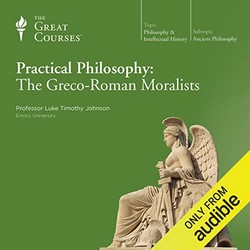
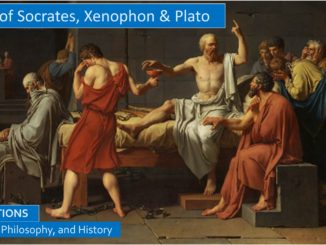
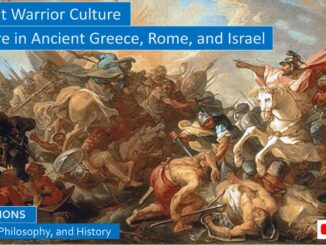
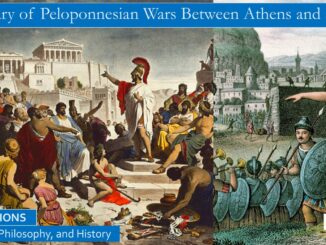
Be the first to comment